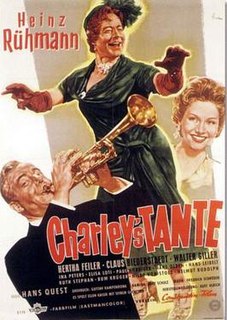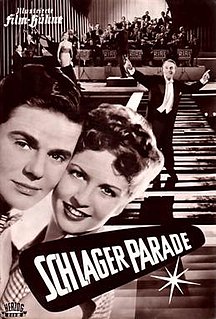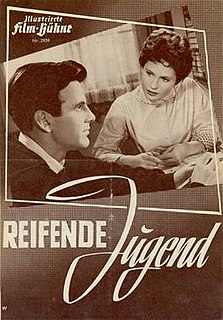
And That on Monday Morning is a 1959 West German comedy film directed by Luigi Comencini and starring O.W. Fischer, Ulla Jacobsson and Vera Tschechowa. Based on the 1955 British play Mr. Kettle and Mrs. Moon by J. B. Priestley, it was entered into the 9th Berlin International Film Festival. It was shot at the Spandau Studios in Berlin. The film's sets were designed by the art directors Helmut Nentwig and Ernst Schomer.

The Marriage of Mr. Mississippi is a 1961 Swiss-West German comedy film directed by Kurt Hoffmann and starring O.E. Hasse, Johanna von Koczian and Martin Held. It is based on the 1952 play with the same title by Friedrich Dürrenmatt. It was entered into the 11th Berlin International Film Festival. The film was shot at the Spandau Studios in Berlin, and on location in Zurich. The sets were designed by the art directors Hertha Hareiter and Otto Pischinger.

Charley's Aunt is a 1956 West German comedy film directed by Hans Quest and starring Heinz Rühmann, Hertha Feiler and Claus Biederstaedt. It is an adaptation of the 1892 British play Charley's Aunt by Brandon Thomas.

A Student's Song of Heidelberg is a 1930 German musical film directed by Karl Hartl and starring Hans Brausewetter, Betty Bird and Willi Forst. It marked Hartl's directoral debut. The film is in the tradition of the nostalgic Old Heidelberg.

Chronicles of the Gray House is a 1925 German silent historical drama film directed by Arthur von Gerlach and starring Paul Hartmann, Rudolf Forster and Lil Dagover.

The Glass Tower is a 1957 West German drama film directed by Harald Braun and starring Lilli Palmer, O.E. Hasse and Peter van Eyck. It was made by Bavaria Film at their studios in Munich. The film's sets were designed by the art director Walter Haag. Palmer plays the role of an adulterous socialite.

Calais-Dover is a 1931 French-German comedy film directed by Jean Boyer and Anatole Litvak and starring Lilian Harvey, André Roanne and Armand Bernard. It is the French-language version of the German film No More Love, with Harvey reprising her role. The title refers to the Dover–Calais ferry.

Don't Dream, Annette is a 1949 German comedy film directed by Eberhard Klagemann and Helmut Weiss and starring Jenny Jugo, Max Eckard and Karl Schönböck. It was made by DEFA in the Soviet Zone of Germany which was soon afterwards to become East Germany.

The Empress and I is a 1933 German musical comedy film directed by Friedrich Hollaender and starring Lilian Harvey, Mady Christians and Conrad Veidt. It is also known by the alternative title of The Only Girl. The film was produced as a multi-language version. Moi et l'impératrice a separate French-language version was released as well as The Only Girl in English. The multilingual Harvey played the same role in all three films.

Die Fledermaus is a 1946 German operetta film directed by Géza von Bolváry and starring Marte Harell, Johannes Heesters, and Will Dohm. It is based on Johann Strauss II's 1874 work of the same name.

The Sergeant's Daughter is a 1952 West German war romance film directed by George Hurdalek and starring Johanna Matz, Jan Hendriks and Friedrich Domin. It was based on a 1903 novel by Franz Adam Beyerlein which portrayed life in the army of William II.

Hit Parade is a 1953 West German musical comedy film directed by Erik Ode and starring Germaine Damar, Walter Giller and Nadja Tiller.

The Last Waltz is a 1953 West German musical romance film directed by Arthur Maria Rabenalt, and starring Eva Bartok, Curd Jürgens, and O. E. Hasse.

A Man Like Maximilian is a 1945 German comedy film directed by Hans Deppe and starring Wolf Albach-Retty, Karin Hardt and Lizzi Waldmüller. It was one of the last films released during the Third Reich and was playing in cinemas during the Battle of Berlin.

Ripening Youth is a 1955 West German drama film directed by Ulrich Erfurth and starring Adelheid Seeck, Maximilian Schell, and Albert Lieven.

The Girl from Flanders is a 1956 romantic drama film directed by Helmut Käutner and starring Nicole Berger, Maximilian Schell, and Viktor de Kowa. It portrays the relationship between a Belgian woman and a German soldier during the First World War.

Sacred Lie is a 1955 West German drama film directed by Wolfgang Liebeneiner and starring Ulla Jacobsson, Karlheinz Böhm and Erwin Strahl.

The Eternal Tone is a 1943 German drama film directed by Günther Rittau and starring Elfriede Datzig, Rudolf Prack and Olga Tschechowa.

And Lead Us Not Into Temptation is a 1957 West German drama film directed by Rolf Hansen and starring Johanna Matz, Heidemarie Hatheyer and Gerhard Riedmann.

Life Begins at Eight is a 1962 West German drama film directed by Michael Kehlmann and starring O.E. Hasse, Johanna Matz and Helmut Wildt. It is an adaptation of the 1940 play The Light of Heart by Emlyn Williams, previously adapted into a 1942 Hollywood film Life Begins at Eight-Thirty. The action is moved from the play's setting of London to Berlin.




















